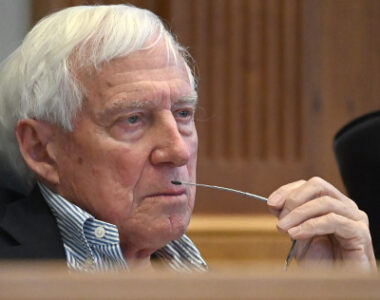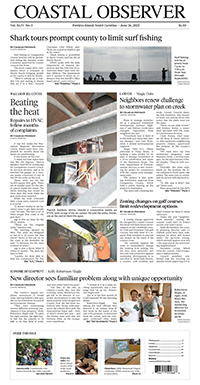Georgetown County
Anderson says state tax credit costs county $5.4 million

Farm and timber land in Georgetown County that’s valued at over $800 million pays just under $700,000 a year in property taxes. County Council Member Bob Anderson would like to see that revenue grow to $6 million, but it would require the state to alter a decades-old tax credit.
“It smells from one end to the other,” Anderson said.
The property is subject to a “special land credit” that was adopted by the state legislature in the 1970s. At the time, it reduced the value of farm and timber property that is subject to property taxes by about 25 percent. Over nearly 50 years, the credit has reduced the taxable value of that property to around 90 percent.
“Georgetown County has lost millions of dollars in property tax revenue over the years and we were unaware of this injustice,” Anderson wrote in a paper outlining that credit and its impact that he sent to his six colleagues on the council last summer. He said none contacted him about the issue.
Anderson contacted the S.C. Association of Counties, which circulated his paper among officials in the state’s 46 counties. Amending the tax credit is not among the association’s priorities for the legislative session that begins next week.
It isn’t a priority for local legislators, either.
“It’s certainly not practical,” said state Sen. Stephen Goldfinch.
State Rep. Lee Hewitt said he got calls from the Forestry Association of S.C. and the S.C. Farm Bureau after Anderson circulated his paper.
“The bottom line is, you go around this state and start raising taxes on our farmers and our timberland, I don’t know how well that’s going to be received,” Hewitt said. “I don’t know how well it’s going to be received in Georgetown County.”
Anderson said he plans to ask Angela Christian, the county administrator, to schedule a council workshop to discuss the tax credit.
“The first thing we need to do is get this council signed up,” Anderson said. Then, “we’ve got to somehow reach out to every county elected official in the state.”
Cam Crawford, the president of the Forestry Association, had an accountant run the numbers on Anderson’s proposal. They matched what Anderson found.
If the special land credit was rolled back to the level established in the 1970s, Georgetown County would see an additional $5.4 million in property tax revenue. That’s an increase of 770 percent, Crawford pointed out.
“It would be devastating to these farmers and timberland owners,” he said. “There’s no other word for it.”
Anderson said he isn’t opposed to a phased-in rollback of the tax credit, although he doesn’t want to wait another 50 years.
What drew his attention to the tax was the fact that about 80 percent of Georgetown County’s assessed property value comes from the Waccamaw Neck. He said he assumed it was the result of growth along the coast.
“I just always thought there’s got to be more to it than this,” Anderson said.
It was the county’s property assessor, Tim Holt, who first pointed out the impact of the special land credit. Anderson got someone to help him with the history of the credit and its impact.
“I found somebody that had been around. He said, ‘hey, I don’t want to get in the middle of this,’” Anderson said.
It was taxation that led to the creation of the Forestry Association, said Crawford, who has written a book about the history of the state’s timber industry. It includes an entire section about the tax issue. The reason the credit was important was because the state changed its tax code to provide uniform property assessments. The value of agricultural land was based on the value of its crops. That meant timber growers were being taxed on the value of a product that might not be harvested for years.
In 1976, the legislature passed a bill linking the value of agricultural property to its “productive capacity” of its soil. The credit was based on crop data over three years. Anderson said it was supposed to be adjusted every three years going forward, but said that never happened. When an adjustment was proposed in 1991, the legislature took no action.
Crawford said he found no evidence that the value of the credit was intended to rest.
“His version of history and our version, you can’t reconcile them,” he said.
Goldfinch noted that “inaction by the legislature is action.” Neither he nor Hewitt believe there is support in the legislature to change the tax credit.
“Nobody would say the tax system in South Carolina is not flawed,” Hewitt said. “An overhaul of the entire tax structure in South Carolina is needed. However, anytime you do that it turns into a fight.”
Changing the tax credit would impact more than the tax structure, Crawford said.
“Everybody that owns private timberland would probably sell it,” he said. “You’d end up with development everywhere. No trees.” That would impact air and water quality, he added.
“The agricultural land and forest land, they don’t require a lot of services,” Crawford said. “They provide a lot of benefits.”
Anderson said he intends to press the issue. He is up for re-election this year and said he was told that the Farm Bureau was looking for someone to run against him. The bureau did not respond this week for a request for comment.




